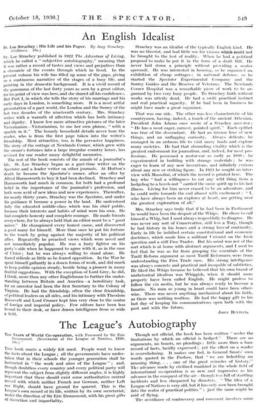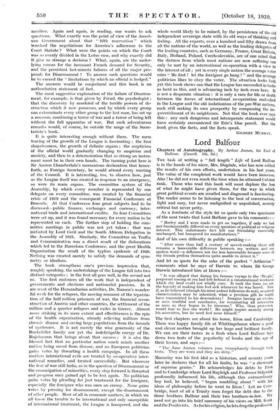The League's Autobiography
Ten Years of World Co-operation, with Foreword by Sir Erie
THIS book meets a widely felt need. People want to know the facts about the League ; all the governments have under- taken that in their schools the younger generation shall be instructed in " the work and aims of the League " ; and, though doubtless every country and every political party will represent the subject from slightly different angles, it is highly important that there should exist some authoritative central record with which neither French nor German, neither Left nor Right, should have ground - for quarrel. This is the League's own-record-Of tts life; wiitten by its own secretariat, under the direction of Sir Eric Drummond, with his great gifts of discretion and impartiality.'
Though not official, the book has been written under the limitations by which an official is hedged." There are no arguments, no boasts, no pleadings : little more than a bare record of facts, lucidly expressed ; yet the effect on a reader is overwhelming. It makes one feel, in General Smuts' own words quoted in the Preface, that " we are beholding an amazing thing, . . . one of the great miracles of history." Th2 advance made by civilized mankind in the whole field of international co-operation is as new and impressive as his advance in the conquest of the air—though less full of startling incidents and less chequered by disasters. " The idea of a League of Nations is very old, but it has only now been brought into the reahn of practical polities " : just the same might be said of flying.
The avoidance of controversy and comment involves some sacrifice. Again and again, in reading, one wants to ask questions. What exactly was the point of view of the Ameri- can Government about that "fifth reservation" which Is reeked the negotiations for America's adherence to the Court Statute ? What were the points on which the Court was so evenly divided in the Lotus case, and why exactly did it give so strange a decision ? What, again, are the under- lying causes for the incessant French demand for Security, and the persistent last-minute failures of all the major pro- posals for Disarmament ? To answer such questions would be to exceed the " limitations by which an official is hedged."
The answers would be conjectural and this book is an authoritative statement of fact.
The most suggestive explanation of the failure of Disarma- ment, for example, is that given by Freud, the psychologist : that the discovery by mankind of the terrific powers of de- struction which it now possesses, and by which every group can exterminate every other group to the last man, has set up a neurosis, combining a terror of war and a terror of being left without the full apparatus of war. But such adventurous remarks would, of course, be outside the range of the Seere- tariate's book.
It is quite interesting enough without them. The mere tracing of the growth of the League is fascinating : the first shapelessness, the growth of definite organs ; the scepticism of the official world gradually changing to suspicion and anxiety, and then to a determination that so strong an instru- ment must be in their own hands. The turning point here is Sir Austen Chamberlain's momentous declaration that hence- forth, as Foreign Secretary, he would attend every meeting of the Council. It is interesting, too, to observe how, just as the League itself was created in response to an emergency, so were its main organs. The committee system of the Assembly, by which every member is represented by one delegate on every committee, was created by the financial crisis of 1919 and the consequent Financial Conference at Brussels. At that Conference four great subjects had to be discussed—public finance, exchanges and currency, inter- national trade and international credits. So four Committees were set up, and it was found necessary for every nation to be represented on each. The further step of holding the com- mittee meetings in public was not yet taken : that was initiated by Lord Cecil and the South African Delegation in the Assembly of 1921. Similarly, the Committee on Traffic and Communication was a direct result of the dislocations which led to the Barcelona Conference, and the great Health Organization the result of the typhus epidemic of 1920. Nothing was created merely to satisfy the demands of sym- metry or idealism.
The book strengthens one's previous impression that, roughly speaking, the undertakings of the League full into two distinct categories ; in the first all goes well, in the second not so. The first embraces all the work that is independent of governments and elections and nationalist passions. In it arc most of the Humanitarian activities, Dr. Nansen's wonder- ful work for the refugees, the moving romance of the repatria- tion of the half million prisoners of war, the financial recon- struction of Austria and other countries, the settlement of the million and a quarter refugees and exiles in Greece. Almost more striking in its mere extent and effectiveness is the epic of the health organization, already relieving millions from chronic disease and saving large populations from the inroads of epidemics. It is not merely the wise generosity of the Rockefeller family nor yet the indefatigable energy of Dr. Hakim:arm that brings about that success : it is also the blessed fact that no particular nation much minds another nation being saved from disease, and no European politician gains votes by thwarting a health campaign. In all these matters international evils arc treated by co-operative inter- national remedies, and treated successfully. But wherever the fear of war still lurks, as in the question of Disarmament or the emancipation of minorities, every step forward is thwarted and progress once gained apt to be lost again. No politician gains votes by pleading for just treatment for the foreigner, especially the foreigner who was once an enemy. None gains votes by pressing for disarmament, except the disarmament of other people. Most of all in economic matters, in which we all know the trouble to be international and only susceptible of international treatment, the League is hampered, and the
whole world likely to be ruined, by the persistence of the old independent sovereign state with its old ways of thinking and feeling. All the experts, over a hundred and fifty drawn from all the nations of the world, as well as the leading delegates of the leading countries, such as Germany, France, Great Britain, Italy, Holland, Poland, Czechoslovakia, are'of one mind that the distress from which most nations are now suffering can only be met by an international co-operation with a view to the interest of all ; yet in every single nation the average voter cries " Me first ! let the foreigner go hang ! " and the average politician likes to obey the voter. The situation looks Lad; yet this book shows one that the League has succeeded in tasks as hard as this, and is advancing inch by inch even here. It is not a desperate situation : it is only a race for life or death between the forces of international co-operation embodied in the League and the old isolationism of the pre-War nations, each still seeking its own prosperity by compassing the im- poverishment of its neighbours. Not that the book ever says this : any such dangerous and intemperate statement would have certainly encountered Sir Eric's blue pencil. But the book gives the facts, and the facts speak.
GILBERT MURRAY.

























































 Previous page
Previous page